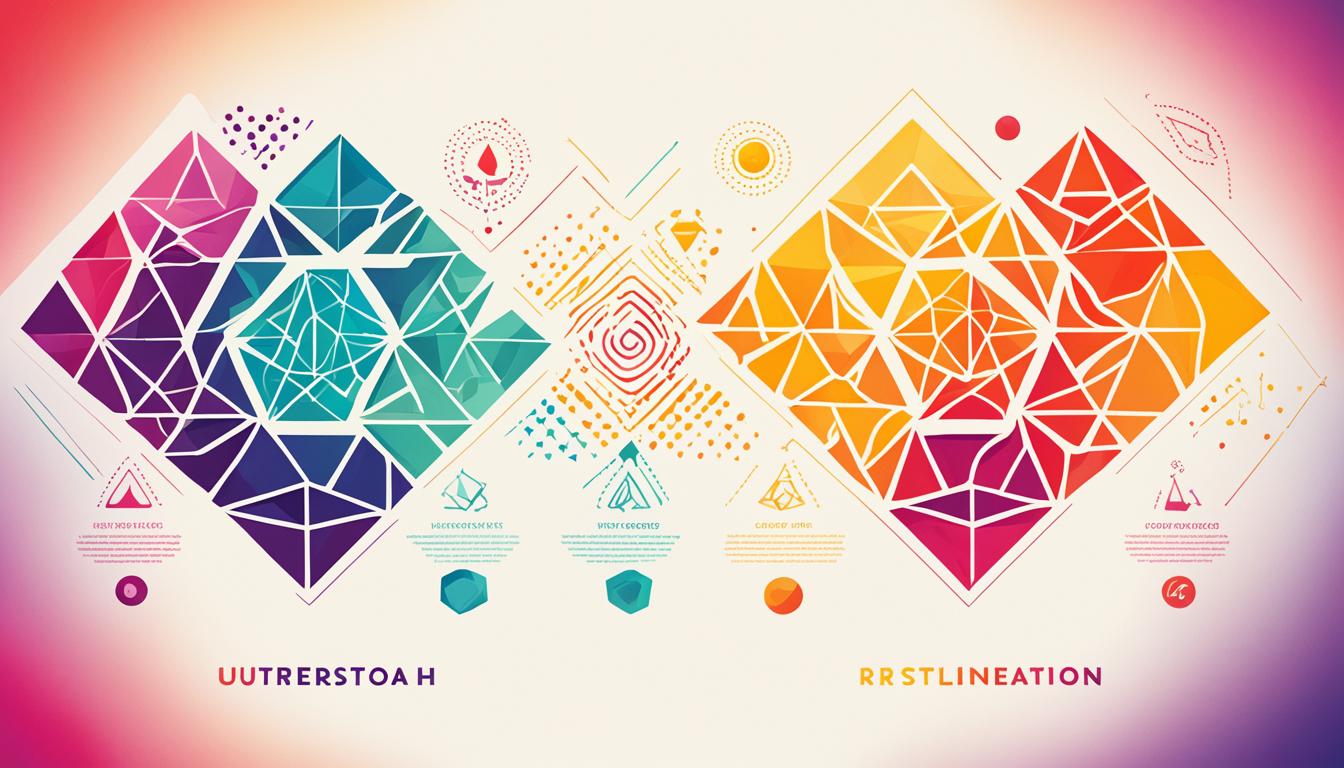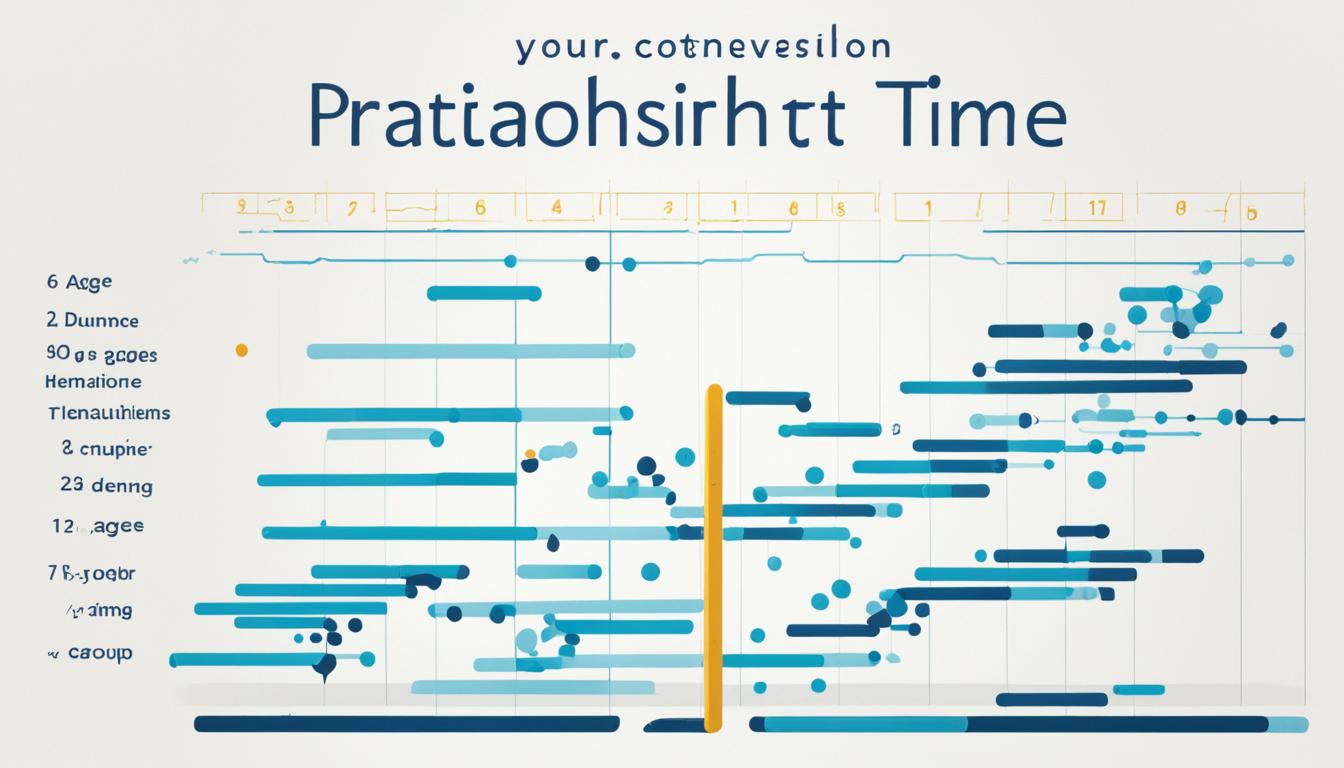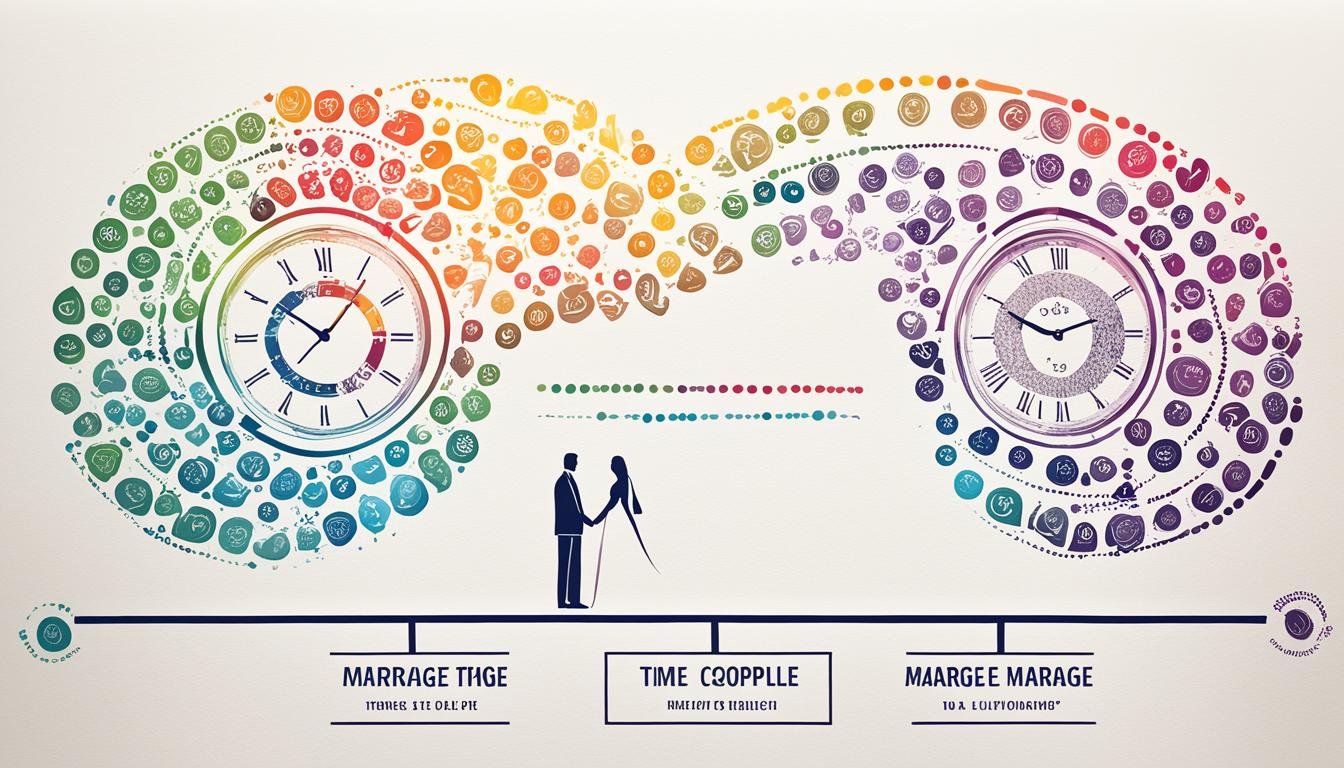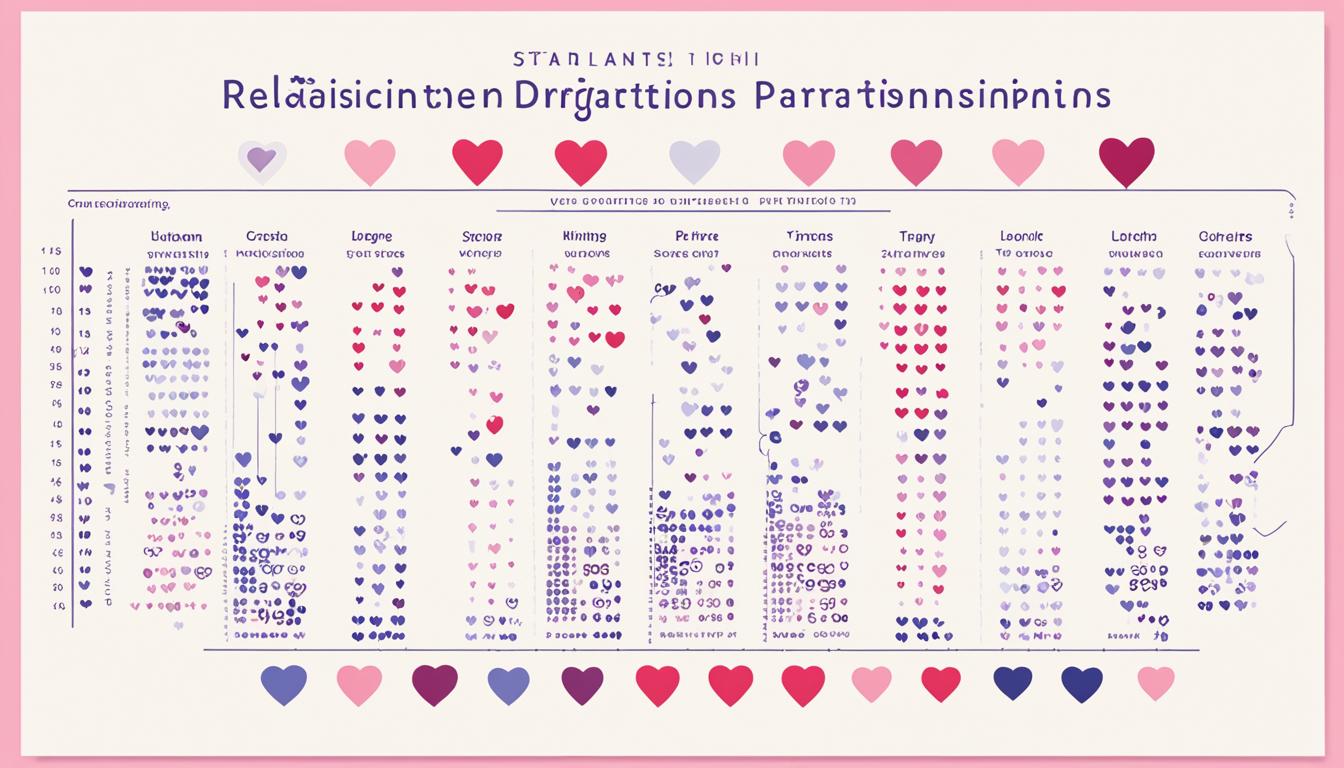Are you curious about how long relationships typically last? Understanding the average relationship duration can provide valuable insights into the dynamics of romantic partnerships. Let’s explore relationship duration statistics and factors that influence relationship longevity.
Key Takeaways:
- The average relationship length is 2 years and 9 months, according to a study of 4,000 people.
- 70% of relationships fail within the first year, but the failure rate significantly decreases after the first year.
- By year 5, only 20% of relationships fail.
- Couples typically say “I love you” at around 5 months.
- The average length of a marriage is 8.2 years.
Factors Influencing Relationship Longevity
When it comes to the longevity of a relationship, several factors play a crucial role. These factors determine whether a relationship can stand the test of time or fizzle out prematurely. Here are the key factors that influence relationship longevity:
Trust
Trust forms the foundation of any strong and lasting relationship. It allows you and your partner to be open and vulnerable with each other, fostering a sense of security and honesty. Trust is built over time through consistency, reliability, and transparency in your actions and words.
Effective Communication
Effective communication is essential to maintain a healthy and thriving relationship. It involves active listening, expressing your thoughts and feelings clearly, and ensuring that both partners feel heard and understood. Regular and open communication helps resolve conflicts, strengthens emotional bonds, and fosters genuine connection.
Compatibility
Compatibility refers to the alignment of values, interests, and goals between partners. When you and your partner share similar beliefs and aspirations, it becomes easier to navigate life together. Mutual compatibility lays the groundwork for a harmonious and balanced relationship.
Shared Values and Goals
Shared values and goals provide a sense of direction and purpose in a relationship. When both partners have common values and are working towards similar goals, they can support and inspire each other. This shared vision creates a strong bond and fosters a sense of unity.
Emotional Connection
Emotional connection is the deep and intimate bond you share with your partner. It involves understanding, empathy, and a genuine emotional attachment. Building and nurturing this connection requires emotional vulnerability, compassion, and prioritizing each other’s emotional well-being.
Conflict Resolution
Resolving conflicts is an inevitable part of any relationship. How you and your partner handle disagreements and challenges can significantly impact relationship longevity. Healthy conflict resolution involves active listening, compromising, seeking common ground, and finding mutually beneficial solutions.
Engaging in Novel Activities
Engaging in novel activities together can inject excitement and freshness into a relationship. Trying new experiences, exploring shared interests, and challenging yourselves as a couple can increase relationship satisfaction and create lasting memories.
To increase the odds of relationship survival, it’s important to nurture these factors consistently. Remember that relationships require effort, understanding, and mutual growth. By prioritizing trust, communication, compatibility, shared values, emotional connection, and conflict resolution, you can enhance the longevity and fulfillment of your relationship.

Relationship Duration by Age Group
When it comes to relationships, the duration can vary depending on your age group. Teenagers, who are often experiencing their first relationships, tend to have shorter relationship lengths. On average, younger teenagers dating for the first time have relationships that last around 8 months. However, as individuals enter their twenties, the average relationship length increases.
In the twenties age group, the average relationship duration is around 3 years. This is a significant increase compared to the teenage years and can be attributed to factors such as increased maturity and a better understanding of what one is looking for in a long-term relationship. In your twenties, you may have a clearer sense of your goals, values, and compatibility with your partner, leading to longer-lasting relationships.
As you move into your thirties, the average relationship duration continues to increase to around 4 years. By this point, individuals often have a better understanding of themselves and their expectations in a partnership. This increased self-awareness can contribute to stronger, more stable relationships.
It’s important to remember that these are just average relationship lengths and individual experiences may differ. Relationships are unique and influenced by various factors such as personal growth, compatibility, and communication. Ultimately, the length of a relationship is determined by the individuals involved and their willingness to invest time and effort into maintaining a strong bond.

Relationship Length Before Marriage
When it comes to taking the next big step in a relationship, such as getting engaged and getting married, couples often wonder how long they should wait. On average, couples spend around 2 years in a relationship before deciding to tie the knot.
However, it’s important to remember that the length of time before engagement can vary significantly from couple to couple. Some couples may feel ready to take that leap within 6 months, while others may choose to wait 7 years or longer. The decision to get engaged should be based on the individual dynamics and readiness of the couple involved.
Interestingly, research has shown that there is a significant decline in the engagement rate after 7 years, a phenomenon commonly referred to as the “seven-year itch.” This term represents a stage in a long-term relationship where the initial excitement may start to wane, and couples may experience a decline in their desire to get married.

On average, the length of time from the start of a relationship to marriage is approximately 4.9 years. This includes the period of dating, engagement, and planning for the wedding.
It’s important to note that these statistics are just average figures and should not be taken as a strict guideline for every couple. Every relationship is unique, and the decision to get married should be based on the personal circumstances and preferences of the individuals involved.
High School Relationships
When it comes to high school relationships, it’s no surprise that they tend to be shorter in duration compared to relationships in older age groups. On average, a high school relationship lasts around 14 months. However, it’s important to note that the duration of these relationships can vary depending on the age of the teenagers involved.
Younger teenagers, who may be experiencing their first romantic relationships, tend to have shorter relationships that last around 8 months. As teenagers grow older and gain more experience in relationships, the duration tends to increase. Older teenagers can have longer relationships that last around 20 months. This can be attributed to factors such as increased emotional maturity and a better understanding of what they are looking for in a partner.
Average high school relationship length: 14 months
Teenage relationship duration range: 8-20 months

While high school relationships may be relatively short, they can still be significant learning experiences for teenagers. These relationships provide an opportunity for young individuals to explore their emotions, gain a better understanding of themselves and others, and develop important interpersonal skills.
Overall, high school relationships are a stepping stone towards more mature and long-lasting relationships in the future. By navigating the ups and downs of teenage romance, individuals gain valuable insights that shape their approach to relationships as they grow older.
The Impact of Communication and Trust
Effective communication and trust are essential for maintaining a healthy and long-lasting relationship. When couples can openly and honestly express their thoughts, feelings, and concerns, they are more likely to stay together. It is through effective communication that we truly connect with our partners, fostering understanding and intimacy.
Active listening is a crucial component of effective communication in relationships. It involves giving your partner your full attention, seeking to understand their perspective, and responding with empathy. By actively listening, you create a safe space for your partner to share their thoughts and feelings, promoting a deeper connection between you.
“Communication is the fuel that keeps the fire of a relationship burning. It is the key to deepening intimacy, resolving conflicts, and building trust.”
Conflict is inevitable in any relationship, but it’s how we handle it that makes all the difference. Effective conflict resolution involves finding a balance between assertiveness and empathy. It requires active listening, expressing your needs and concerns without blame or criticism, and working together to find mutually satisfactory solutions.

Trust is the foundation upon which relationships are built. It develops over time through transparency, honesty, and consistency. Without trust, a relationship is likely to face challenges and difficulties. Trust allows partners to feel secure and safe, knowing that they can rely on each other in both good times and bad.
“Trust is the glue of any relationship. It allows couples to feel secure, be vulnerable, and build a strong and lasting bond.”
Building and maintaining trust requires open and honest communication. It involves keeping your promises, being reliable, and being accountable for your actions. Trust is not something that can be demanded; it must be earned through consistent behavior and actions that demonstrate your trustworthiness.
In summary, effective communication and trust are the cornerstones of a healthy and long-lasting relationship. By actively listening, expressing your needs and concerns, and working through conflicts with empathy and respect, you can foster a deeper connection with your partner. In addition, building trust through transparency, honesty, and consistency will create a strong foundation for your relationship to thrive.
Conclusion
Maintaining a long-lasting relationship requires effort and dedication. While the average relationship length may vary, there are several tips you can follow to improve the longevity of your relationships.
First, be selective in choosing partners. Invest time in getting to know someone before committing to a relationship. Ensure that you share common values, goals, and interests, as well as emotional and intellectual compatibility.
Second, work on personal growth and self-improvement. Continuously strive to become the best version of yourself. This not only benefits you individually but also enhances the overall dynamics of your relationship.
Lastly, find healthy ways to resolve conflicts. Effective communication is crucial for maintaining a strong bond with your partner. Practice active listening and aim to understand each other’s perspectives. By fostering an environment of trust and understanding, you can overcome obstacles together and strengthen your relationship in the process.
FAQ
How long does the average relationship last?
According to a study of 4,000 people, the average relationship length is 2 years and 9 months. However, the length of a relationship can vary depending on various factors, such as age, location, and individual preferences.
What factors influence relationship longevity?
Factors such as trust, effective communication, compatibility, shared values and goals, emotional connection, and the ability to resolve conflicts can greatly influence the longevity of a relationship. Engaging in novel and challenging activities together has also been shown to increase relationship satisfaction.
How long do relationships typically last by age group?
Teenagers typically have shorter relationships, with younger teenagers dating for the first time having relationships that last around 8 months. In the 20s age group, the average relationship length is around 3 years, while in the 30s, it increases to 4 years.
How long is the engagement duration before marriage?
On average, couples spend around 2 years in a relationship before getting engaged. The length of time before engagement can vary, with some couples getting engaged within 6 months, while others may wait 7 years or longer.
How long do high school relationships typically last?
The average high school relationship lasts around 14 months. However, the duration of high school relationships can vary depending on age, with younger teenagers having shorter relationships of around 8 months, and older teenagers having longer relationships of around 20 months.
What is the impact of communication and trust on a relationship?
Effective communication and trust are critical for maintaining a healthy and long-lasting relationship. Couples who can openly and honestly express their thoughts, feelings, and concerns are more likely to stay together. Trust, which is built over time through transparency and honesty, is the foundation of a strong relationship.
How can I improve the longevity of my relationship?
Individuals can improve the longevity of their relationships by being selective in choosing partners, working on personal growth and self-improvement, and finding healthy ways to resolve conflicts. Prioritizing effective communication, trust, and mutual understanding can increase the chances of maintaining a long and fulfilling relationship.
Source Links
- https://www.thehivelaw.com/blog/how-long-does-the-average-relationship-last/
- https://adultist.org/posts/how-long-does-a-relationship-typically-last-in-your-20s
- https://www.allohealth.care/healthfeed/sex-education/how-long-do-most-relationships-last-before-breaking-up


